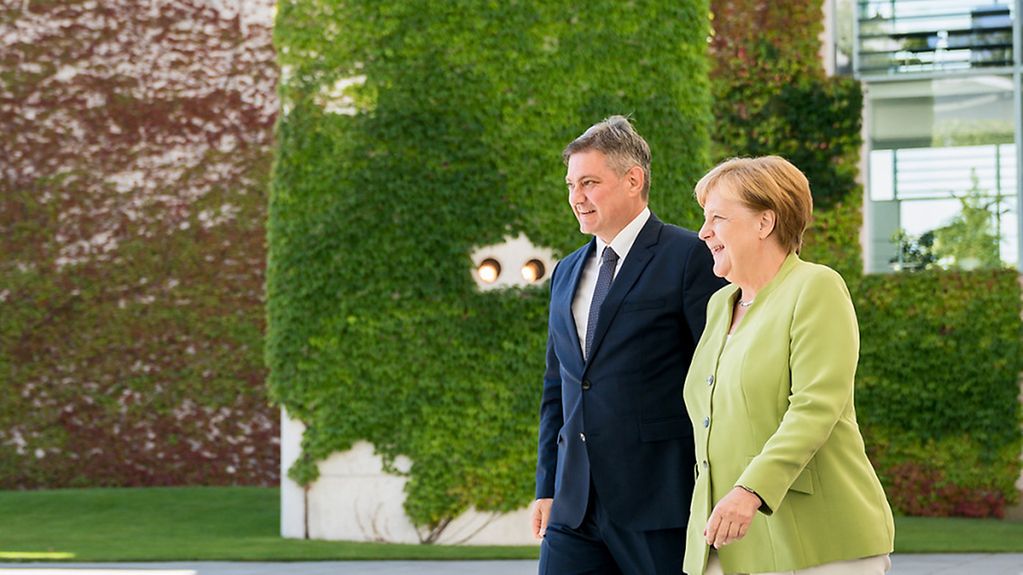Der Link wurde in Ihrer Zwischenablage gespeichert
Germany will remain an important partner for Bosnia and Herzegovina, Chancellor Angela Merkel assured Denis Zvizdić, Chairman of the country’s Council of Ministers. The two countries intend to step up their already close cooperation to address illegal migration.
4 Min. Lesedauer

Chancellor Angela Merkel met with Denis Zvizdić, Chairman of the Council of Ministers of Bosnia and Herzegovina, in Berlin.
Foto: Bundesregierung/Kugler
In view of the complicated state structure of Bosnia and Herzegovina, Denis Zvizdić’s job as Chairman of the Council of Ministers is "not an easy one", stressed Chancellor Angela Merkel, following their meeting at the Federal Chancellery. She also praised the "many efforts" undertaken by her counterpart on the economic front.
In July Angela Merkel met Denis Zvizdić at the Western Balkans Summit in London. She reported that they had agreed on three main points at their meeting today in Berlin:
Firstly, the territorial integrity of the Western Balkan states is "inviolable". The Chancellor rejected all moves to review the borders drawn in the wake of the war that shook the Balkans in the 1990s. "We cannot do that," she stressed.
And, she added, all Western Balkan states have prospects of accession to the EU. Bosnia and Herzegovina hopes to be granted the status of candidate country as soon as possible. But before this can happen, hundreds of questions must be answered. "We have encouraged the government and individuals responsible to respond swiftly to the questions of the European Commission," said Angela Merkel.
Bosnia and Herzegovina is also to be offered the chance to join NATO; the country has initially been invited to join the Membership Action Plan. Germany sees "excellent prospects that this could be achieved before the end of the year".
In 2014 the Chancellor launched the "Berlin Process" with the first Western Balkans Conference. The aim is to achieve reconciliation among the states of the Western Balkans, and to provide practical support on necessary structural reforms. This series of conferences is distinct from the efforts of these states to move closer to the EU and from accession negotiations. The summit held on 10 July 2018 in London was the fifth conference of its sort. In 2019, heads of state and government will meet in Poland.
Since last year, Bosnia and Herzegovina has seen an increase in the number of refugees. Angela Merkel and Denis Zvizdić discussed the reasons for this shift. "This can only be resolved in cooperation with Serbia and Croatia." The EU is endeavouring to do all it can to support Bosnia and Herzegovina.
Angela Merkel thanked Denis Zvizdić for the fact that his county is attempting to ensure a humanitarian approach to dealing with refugees. "Your country still knows from its own experience what it means to flee or to be forced to leave your home." Nevertheless, stated the Chancellor clearly, the two sides agreed that "illegal migration cannot be the way to get to Europe".
With a view to the elections to be held soon in Bosnia and Herzegovina, the Chancellor called for the electoral reform to be finalised. The Venice Commission, an advisory body of the Council of Europe, could be key to finding a solution in this context, suggested the Chancellor. "But this obviously presupposes that all sides are willing to embrace compromise," she underlined.
What is even more serious is that in conjunction with the reform of criminal law, there is a legal vacuum. Germany will be watching, as it must of course be possible to conduct criminal investigations and prosecute cases of corruption, organised crime and terrorism, and that this action must indeed be stepped up. Legal vacuums in this context, stated Angela Merkel unequivocally, are "not helpful and not acceptable".
Germany, an important economic partner, will provide assistance in Bosnia and Herzegovina in the form of direct investment. Dual vocational training too is important, in order to give young people genuine prospects. For German companies, however, the question of effective legal protection is very important.
Overall, the Chancellor summed up, cooperation in the Western Balkans has "improved enormously in spite of all the problems". The "Berlin Process" is making a major contribution in this context. Now, the agreed science and research foundation must be launched by 2019. Science and research, as well as school and university education are "vitally important" for the states of the Western Balkans.
Germany consistently encourages the leaders of these states to cooperate closely – and, said Angela Merkel, "substantial progress has been made over the last few years". Germany states "very frankly what we would like to see improve", but "with a view to what is feasible", and the country stands shoulder to shoulder with Bosnia and Herzegovina.